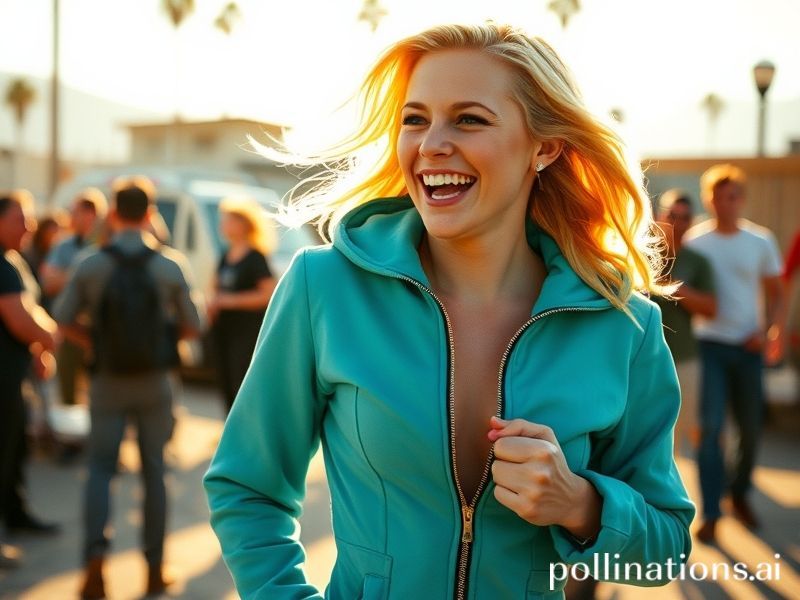How Kaitlin Olson Accidentally Became America’s Last Globally Trusted Export
The Curious Case of Kaitlin Olson: How a Philadelphia-Trained Clown Became the Last Reliable Export the United States Still Makes
Dateline: Anywhere with Wi-Fi and a streaming account
You know the world is on fire when a 48-year-old American comic actress becomes the closest thing we have to globally trusted currency. While Silicon Valley titans beg for bailouts and European parliaments argue over whose turn it is to hate the algorithm, Kaitlin Olson keeps quietly cashing checks in 27 languages—proof that slapstick, properly weaponized, outperforms the S&P 500.
From Bogotá binge-watchers to Seoul subway commuters, Olson’s face—elastic, fearless, unapologetically asymmetrical—slides across screens without the help of dubbing or diplomatic immunity. Her curriculum vitae reads like a State Department briefing that got drunk on boxed wine: born in Portland, trained with the Groundlings in L.A., hardened in the Philadelphia crucible of “It’s Always Sunny in Philadelphia,” where she perfected the art of falling down stairs while delivering a TED Talk on ethical capitalism. Somewhere between the seventh concussion and the fifteenth Emmy snub, she accidentally became a soft-power asset.
The numbers are almost obscene. Netflix reports that “The Mick” is the most-rewatched half-hour comedy in 18 non-English-speaking territories, beating local productions that actually receive tax rebates. In Argentina, the phrase “¡Haz un Deandra!” has replaced “pull yourself together” as the preferred motivational slogan among underpaid nurses. Meanwhile, the European Commission’s 2023 white paper on cultural influence lists Olson’s physical comedy as a Tier-3 “non-tariff barrier” to homegrown sitcoms—right under K-pop and just above Marvel fatigue.
Why does she travel so well? Anthropologists at the University of Copenhagen suggest it’s the universality of watching a tall blonde woman collide with low expectations. Others point to the geopolitical vacuum: when American prestige imploded sometime between the last drone strike and the last TikTok trend, audiences abroad still craved a certain type of chaos, but with better comic timing. Olson delivers chaos à la carte, no military-industrial seasoning required.
Of course, nothing this side of paradise is pure. Critics in Lagos note that her characters—white, manic, often broke—recycle the American myth that poverty is hilarious as long as it’s photogenic. In Mumbai, left-leaning columnists complain that Dee Reynolds is merely “neoliberal feminism with pratfalls,” which, to be fair, is still more coherent than most State Department press briefings. But even the cynics concede that Olson’s willingness to look genuinely unhinged beats the algorithmic perfection of, say, a South Korean influencer who smiles through eight hours of live commerce and never once farts.
The real intrigue lies in the supply chain. Hollywood keeps threatening to replace human comedians with AI-generated punch-up bots, yet Olson’s contract demands remain stubbornly carbon-based: real bruises, real spit-takes, zero green-screen. That scarcity value has turned her into a quasi-strategic resource. Canada reportedly floated a bilateral agreement to trade thirty-two metric tons of maple syrup for one season of outtakes, while the U.K. considered exchanging Prince Andrew’s Netflix password plus a small Scottish island. Both offers were politely declined—Olson’s agent drives a harder bargain than OPEC.
Meanwhile, back in the imperial core, pundits wonder what her endurance says about the republic. A nation that can still mass-produce self-deprecating blondes must possess some residual life force, even if its bridges are collapsing and its democracy resembles a late-season sitcom that refuses to die. Perhaps the real American Dream is simply this: a woman who once ate a cockroach on cable now negotiates syndication rights in four currencies and still finds time to tweet about municipal composting.
Will Kaitlin Olson save us? Unlikely. But in a world where every other export arrives wrapped in sanctions or spyware, her particular brand of comic nihilism feels almost wholesome—like finding an unexpired Twinkie in a fallout shelter. For now, global audiences will keep trading their increasingly worthless attention for her perfectly timed face-plant, because watching someone else hit rock bottom at least confirms the bottom still exists.
And if it doesn’t, well, she’ll be there first—with a stunt pad, a punchline, and a multinational distribution deal.







